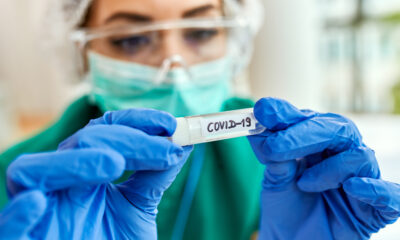
OpEds
As Delta wreaks havoc, vaccination still our best hope
Published
3 years agoon
The third COVID-19 wave is ongoing, driven by the Delta variant of the SARS-CoV-2 virus. In spite of decreasing case numbers in Gauteng, the national test positivity rate is still 21% and not all centres are past the peak of their third wave.
Of all diagnosed COVID-19 cases in the country by the end of July 2021, 3.1% had died (National Institute for Communicable Diseases (NICD) weekly epidemiology, 31 July 2021). Of those cases who were hospitalised, the proportion that died was 23% (Jassat et al, Lancet HIV 2021).
Persons above 60 years of age, those with co-morbidities such as obesity, diabetes, hypertension, cancers, and other chronic illnesses have been especially affected with severe illness.
Let’s not forget those who died at home from COVID-19 disease and other medical problems due to their inability to access medical care during the height of the COVID-19 waves when hospitals were overwhelmed.
Both the Johnson & Johnson (J&J) and Pfizer vaccine used in the South African rollout are highly effective, especially against severe COVID-19, including variants of concern such as the currently circulating Delta variant.
Results of the Sisonke trial, which targeted almost 500 000 health workers with a single dose of the J&J vaccine, were released last week and are very reassuring, showing 91% to 96% protection against COVID-19-related death, and 65% to 66% protection against hospitalisation.
The vaccine cannot protect against all infections, but importantly prevents progression to severe illness. There are, however, vaccinated persons who do experience these “breakthrough infections”.
Breakthrough infections are less likely to progress to severe illness and may be less likely to transmit virus to others. We’re still learning about the transmission dynamics and duration of vaccine-induced or infection-induced immunity.
We recognise that at the time of vaccination, it’s possible to be asymptomatically infected and incubating the virus. This is a particular issue when rolling out a vaccine programme during COVID-19 waves.
It’s also common to let your guard down after vaccination, to stop practising social distancing, masking, and frequent handwashing, and therefore increase your chance of exposure to the virus. None of the vaccines contain replicating live virus, and COVID-19 infection cannot be caused by vaccine administration.
Immunity takes time to build up. Most vaccines will provide protection from severe illness from two to three weeks post vaccination. Protection after only one dose of the Pfizer vaccine is reasonably good, but the second jab is required to ensure maximal protection. It is essential to continue to take all precautions even after being fully vaccinated (mask when indoors with people and keep windows and doors open).
Antibody levels decrease over time, but protection against severe disease or death lasts longer than high antibody levels, probably due to other features of the immune system such as protective T cells which are more difficult to measure. Antibodies don’t perfectly represent protection and aren’t helpful in monitoring the response of an individual to a vaccine.
Some countries may choose to use booster doses. A country’s decision should be based on factors such as global vaccine availability and vaccination coverage of the most at-risk population to determine whether to offer boosters to those already fully vaccinated.
In South Africa, boosters aren’t currently recommended, as the country is still rolling out vaccines to those that require their first dose. Studies are taking place to assess various “mix and match” vaccine combinations, and the results seem promising that many different schedules will eventually become available.
For individuals who experience COVID-19 infection, the recommended interval before receiving a SARS-CoV-2 vaccine is at least 30 days to allow the body time to recover and so that the vaccine dose is a “boost” rather than a “first exposure”.
If you catch COVID-19 between the times of the two Pfizer doses, you should delay your second dose until at least 30 days from when you recover.
These timespans are guidelines and not cast in stone. Generally with vaccines, a longer interval is better at boosting immune responses than a shorter interval. Some individuals are concerned about what happens if they are vaccinated during asymptomatic SARS-CoV-2 infection. There’s no documented harm in being vaccinated during asymptomatic infection.
There are very few contraindications to SARS-CoV-2 vaccination. Individuals with a history of life-threatening anaphylaxis to any medication or vaccine (in which symptoms are sudden closing of the throat, swelling of lips or tongue, and difficulty breathing) or the rare neurological condition Guillain-Barre syndrome should discuss the issue with their doctor as a precaution.
SARS-CoV-2 vaccination can be administered to individuals on anticoagulants and with a history of blood clots such as previous strokes or heart attacks. Patients with malignancies should be vaccinated as they are at higher risk of complications from COVID-19 infection.
Patients on immune suppressants or chemotherapy can be vaccinated. People living with HIV can be vaccinated. In these groups, the vaccine may not work as well as in healthy individuals, but some protection will likely occur.
Patients with most autoimmune conditions and allergies can generally be vaccinated, although they should do so in consultation with their doctors.
For pregnant women who have completed the first trimester, an increasing number of experts are recommending vaccination against SARS-CoV-2. Circulating SARS-CoV-2 virus poses a risk to pregnant women particularly if acquired close to the time of delivery.
Complications can include preterm birth, more severe respiratory disease than in non-pregnant women, and other complications. The SARS-CoV-2 vaccines are non-replicating and don’t cross into the foetus. Animal studies of SARS-CoV-2 vaccination in pregnancy have shown no safety concerns.
In an analysis published in the New England Journal of Medicine of more than 800 women who received the Pfizer SARS-CoV-2 vaccine during pregnancy, there was no difference in pregnancy complications in vaccinated compared with unvaccinated women. There was also no difference in rates of complication in their infants.
It’s therefore the mother’s choice as to whether she wishes to get the vaccine during pregnancy. Ideally vaccination should be postponed until after the first trimester (14 weeks), as with most medications or vaccines administered during pregnancy. Examples of other vaccines routinely given during pregnancy include tetanus and influenza vaccines. For breastfeeding mothers, SARS-CoV-2 vaccination is considered safe, as with most other vaccines.
Mild adverse reactions following SARS-CoV-2 vaccination are common and include fever, chills, fatigue, or a mild headache. These usually resolve within a day or two.
Paracetamol can be taken to alleviate the symptoms, but shouldn’t be taken before vaccination just “in case” of symptoms. If you are concerned about any symptom that seems severe or unusual, first seek medical attention.
Vaccines are more closely studied for safety than any other medication. Information on reporting adverse events is available from the NICD website at www.nicd.ac.za.
While we are in the thick of the pandemic, we should remember that respiratory symptoms or systemic symptoms that last several days or worsen could be indicative of COVID-19 infection, unrelated to vaccination, and warrant COVID-19 testing in the usual way.
By August 2021, the World Health Organization had approved a number of vaccines. There are about 19 different SARS-CoV-2 vaccines being used around the world, and more are in human or preclinical trials.
Vaccine research is continuing at speed to deliver new modes of administration such as via the oral route, as well as second-generation vaccines. The choice between vaccine preparations is based on availability, cost, storage requirements, the dose regimen, and target population.
Differences in the magnitudes of effect reported from phase 3 clinical trials might be related to factors other than effectiveness, including differences in trial populations and locations, the timing of the trials during the pandemic, and study design. The key aim of vaccination is to reduce the risk of severe illness, hospitalisation, and death due to COVID 19.
Hopefully, by September, the number of persons vaccinated against COVID-19 will have increased significantly, and the number of new cases will decrease. We need to continue to apply all COVID-19 prevention measures at home and in the community.
Without these factors, the Rosh Hashanah period may herald an increase in cases and hospital admissions and deaths. Vaccines are our most promising intervention for curbing the pandemic. They save lives, livelihoods, and healthcare systems, even as we get hit by further waves and inevitable new variants.
- Professor Lucille Blumberg is a clinical microbiologist, infectious diseases specialist, and deputy director at the NICD.
- Dr Melinda Suchard is the head of the Centre for Vaccines and Immunology at the NICD.










